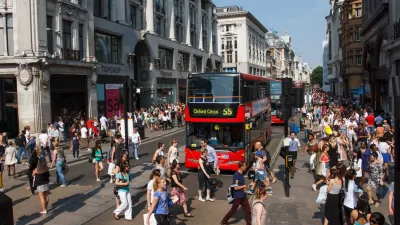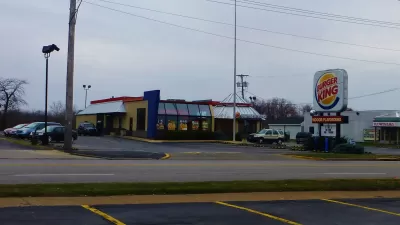Cities across the developing world are dealing more with rising obesity rates as urbanization occurs, reports TheCityFix's Jonna McKone.
In cities, the increased consumption of low-cost and accessible processed foods has supplanted more traditional diets that offer a better micronutrients. There are also disparities in access to food, sometimes resulting in urban "food deserts," where food supermarkets are rare, understocked or overpriced, which further encourages or necessitates the need to drive a car in order to eat healthy food. Food advertisements, also more prevalent in cities, are targeted specifically at children, literally feeding the addiction to unhealthy food. What's more, city life can more often mean a family of two income earners that have less time to prepare food for their families.
The transition away from physical labor, too, results in a loss of physical activity and weight gain. But even in rural areas, the rise in obesity is a problem. Farmers, for instance, who use mechanical farm equipment and may grow one type of crop as opposed to a diversity of vegetables, live in isolated areas where there is often easy access to highly processed food.
The number of overweight individuals now rivals the number of underfed people on the globe. The irony of obesity is that "while some of the poor are becoming plumper, they are not necessarily better fed," says the Food and Agriculture organization of the United Nations. "Obesity often masks underlying deficiencies in vitamins and minerals."
Thanks to Garrett Bradford
FULL STORY: Obesity Poses a Heavy Problem for Developing Cities

Maui's Vacation Rental Debate Turns Ugly
Verbal attacks, misinformation campaigns and fistfights plague a high-stakes debate to convert thousands of vacation rentals into long-term housing.

Planetizen Federal Action Tracker
A weekly monitor of how Trump’s orders and actions are impacting planners and planning in America.

Chicago’s Ghost Rails
Just beneath the surface of the modern city lie the remnants of its expansive early 20th-century streetcar system.

Bend, Oregon Zoning Reforms Prioritize Small-Scale Housing
The city altered its zoning code to allow multi-family housing and eliminated parking mandates citywide.

Amtrak Cutting Jobs, Funding to High-Speed Rail
The agency plans to cut 10 percent of its workforce and has confirmed it will not fund new high-speed rail projects.

LA Denies Basic Services to Unhoused Residents
The city has repeatedly failed to respond to requests for trash pickup at encampment sites, and eliminated a program that provided mobile showers and toilets.
Urban Design for Planners 1: Software Tools
This six-course series explores essential urban design concepts using open source software and equips planners with the tools they need to participate fully in the urban design process.
Planning for Universal Design
Learn the tools for implementing Universal Design in planning regulations.
planning NEXT
Appalachian Highlands Housing Partners
Mpact (founded as Rail~Volution)
City of Camden Redevelopment Agency
City of Astoria
City of Portland
City of Laramie





























